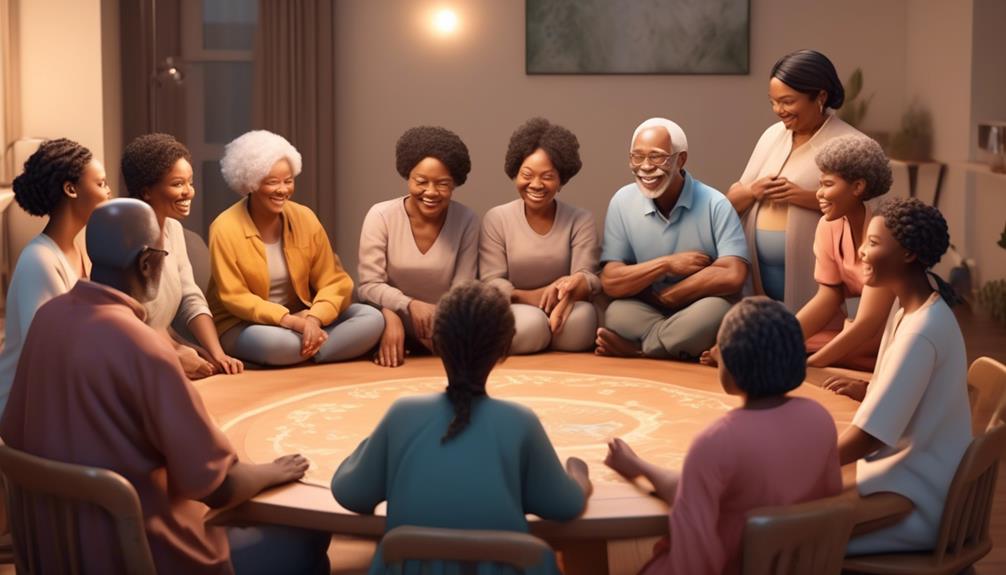Think about end-of-life planning as creating a roadmap for a journey that all of us will eventually take. The decisions we make now will greatly impact how our final moments unfold. By addressing the stages of end of life in advance, we guarantee that our own values and preferences will lead the way when we are no longer able to do so. This careful preparation can provide peace of mind for both ourselves and our loved ones, easing the burden of making tough decisions during emotionally challenging times. Ultimately, having a well-defined plan in place promotes dignity and control in the last chapter of life.
But why is this planning so crucial? Let's explore how preparing for the inevitable can provide peace of mind and ensure our wishes are respected.
Key Takeaways
- Communicate openly with loved ones and healthcare providers.
- Use advance directives to specify medical treatment preferences.
- Plan funeral arrangements to ease burden on family.
- Seek professional advice for informed end-of-life decisions.
Benefits of Advance Care Planning
When considering the benefits of advance care planning, it becomes evident that clarity of wishes and peace of mind are paramount for both individuals and their loved ones.
Advance care planning involves making decisions about the care one would like to receive if they become unable to communicate their preferences. This process ensures that medical treatment aligns with personal values and goals. It also relieves loved ones of the burden of making difficult choices during stressful times.
By documenting preferences in a legal document, such as a living will or health care durable power of attorney, individuals can have their wishes honored regarding end-of-life care. This proactive approach not only empowers individuals to advocate for the care they desire but also provides reassurance to family members, knowing they're fulfilling their loved one's wishes.
Ultimately, advance care planning fosters a sense of control and peace of mind, allowing individuals and their families to navigate challenging healthcare decisions with clarity and confidence.
Tips for Effective Planning

Effective end-of-life planning requires careful consideration of various aspects to ensure that one's wishes are clearly communicated and honored. It's important to make your wishes known to your loved ones and healthcare providers, especially regarding health care decisions.
Advance directives, such as a living will or a healthcare power of attorney, can help in outlining your preferences for medical treatment in case you're unable to communicate them yourself. Furthermore, it's crucial to make arrangements for your funeral and specify how you'd like your assets distributed by creating a will.
Learning about the different options available for end-of-life planning can help you make informed decisions. Talking about death may be difficult, but open communication with family and friends can ensure that everyone is on the same page and reduce potential stress during challenging times.
Seeking advice from professionals in law, finance, and healthcare can also provide valuable guidance in navigating the complexities of end-of-life planning.
Making Health Decisions
Discussing and documenting health decisions is a crucial aspect of comprehensive end-of-life planning. Making informed choices regarding medical decisions ensures that your wishes are respected and followed, particularly during critical moments.
Here are some key components to consider:
- Advance Directives: These legal documents allow you to outline your preferences for medical treatment in advance, ensuring your desires are known and followed.
- DNR Orders: Understanding and discussing Do Not Resuscitate orders is vital as it guides medical professionals on whether to perform life-saving measures.
- Durable Power of Attorney: Designating a healthcare durable power of attorney grants someone you trust the authority to make medical decisions on your behalf when you're unable to do so.
Creating Funeral Plans

As we move from considerations of making health decisions to the crucial aspect of creating funeral plans, individuals can ensure their end-of-life wishes are meticulously outlined and respected. Funeral planning involves decisions on the guest list, ceremony type, music, speakers, decorations, arrangements for an obituary, special features, and preferences for the body's disposition. By providing detailed guidance on funeral arrangements, individuals can help ease the mourning process for their loved ones. It is essential to specify these preferences to ensure that one's wishes are known and respected after their passing. Having a clear plan in place not only gives peace of mind to the individual but also lightens the burden on family and friends during a challenging time. By taking the time to create funeral plans, individuals can express their desires respectfully and alleviate some of the emotional strain on their loved ones.
| Funeral Planning | Benefits |
|---|---|
| Detailed arrangements | Peace of mind |
| Specifying preferences | Lightened burden on family |
| Guidance for loved ones | Respect for wishes |
| Ease the mourning process | Alleviate emotional strain |
Importance of Communication
When we consider the end-of-life planning process, one crucial aspect that can't be overlooked is the significance of open and honest communication. Effective communication about end-of-life preferences reduces the likelihood of unwanted medical interventions, ensuring that an individual's wishes are respected.
Clear communication also empowers loved ones to understand and advocate for these wishes, serving as a vital support system during critical moments. Discussing end-of-life care preferences not only helps family members navigate difficult decisions but also ensures that these decisions align with the individual's values and beliefs.
Open and honest communication fosters trust and respect among family members and healthcare providers, creating a supportive environment where everyone involved feels heard and valued. By openly sharing preferences and concerns, families can work together to honor their loved one's choices and provide the best possible care during challenging times.
Frequently Asked Questions
Why Is Planning for End of Life Important?
Planning for end of life is crucial. It allows us to make decisions on healthcare, distribution of assets, and memorialization. Without proper planning, loved ones may face legal complications and financial burdens.
Why Planning Ahead Is Very Significant?
Planning ahead is very significant as it allows us to ensure our wishes are honored and promotes harmony within our family. It empowers us to make informed decisions about our care and legacy.
Without planning, there can be unwanted treatments and financial burdens for our loved ones. By taking proactive steps now, we can provide peace of mind and clarity for ourselves and our family, fostering a sense of security and preparedness for the future.
What Is Planning Ahead for End-Of-Life Care?
Planning ahead for end-of-life care involves making decisions and arrangements for medical preferences, legal matters, and funeral arrangements. It helps ensure our wishes are respected, reduces stress for loved ones, and provides clarity on medical preferences.
Components include advance directives, healthcare proxy designation, will and testament, funeral arrangements, and organ donation preferences. Planning ahead facilitates family actions according to wishes, ensures financial planning, and gives us a sense of control over our end-of-life care.
Why Is It Important to Plan for Death?
Well, planning for death is not just about making a will and calling it a day. It's about ensuring our wishes are respected and our loved ones aren't left in a pickle.
Without a solid plan, chaos could reign supreme, and decisions might not align with what we want. By taking the time to plan ahead, we can make sure our medical care, funeral arrangements, and assets are handled just the way we want them to be.
Conclusion
In conclusion, it's essential for all of us to engage in end-of-life planning to ensure our wishes are respected.
Did you know that only about 1 in 3 adults in the United States have documented their end-of-life preferences?
By taking the time to plan ahead, we can alleviate stress for ourselves and our loved ones, and make sure our values and beliefs are honored when the time comes.
Start planning today for a more secure future.









